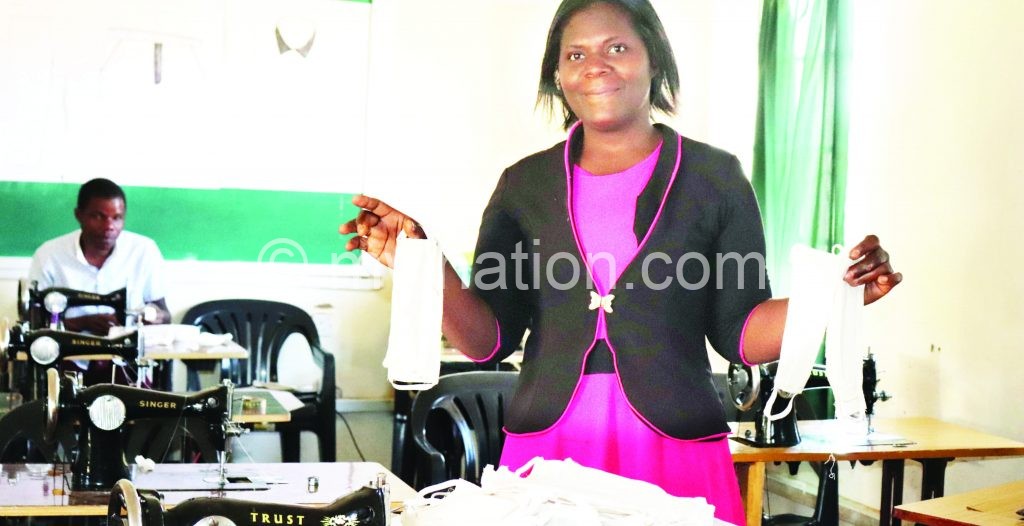Finding sustainable alternatives in fighting Covid- 19
After seeing the rise in demand for re-usable face masks, trainers and other members of staff at Dowa Development Aid from People to People (Dapp) Teacher’s Training College (TTC) embarked on a mission to sew the masks for distribution to family members.
Broad Matemba works as a guard at the institution and has recently developed a hobby in tailoring and hopes it will soon be a career for him.

“I feel happy to be doing this as one way of passing time and learning a trade which can help me to generate money for my family in future,” he says.
Matemba explains that he believes using re-usable face masks is better for his family members as they are cheap and he will be able to make them on his own.
He says: “Now that we are having more Covid- 19 cases in the country, it is important to protect ourselves when going into public places and I advise my family members to put on these masks because they are environmentally friendly and cost less.”
Dapp Dowa sector coordinator Martha Mustafa says the organisation seeks to produce about 8 500 re-usable cloth masks for Dapp staff and family members.
“The target is to distribute three re-usable masks for each person. We have five centres for production, namely Dowa TTC, Chilangoma TTC, Mzimba TTC, Amalika TTC and Mikolongwe Vocational School,” she says.
Mustafa adds that since students are home they thought it wise for the staff members at the production unit to do the production using their tailoring skills.
She says: “We are using materials such as stiff, threads and fabrics which we receive from the headquarters and so far as Dowa TTC, we have produced 739 re-usable masks.”
On why they thought of coming up with the idea of re-usable masks, instead of buying clinical masks, Mustafa says the major reason behind the decision was the safety that comes with re-usable masks.
“One can wash the mask after using it and our fabric is pure white material because we want our users to easily notice the mask when it is dirty.
“And also since it doesn’t have any chemicals in it that can harm people and it can stay for a long time, it means money will be saved while protecting family members from the pandemic,” she adds.
Mustafa says the distribution to family members is ideal as they believe that if one member in a family gets sick then an employee would miss work and will not perform well; hence, the need to protect families first.
Wilfred Zembere, who is a cashier at Dapp Dowa, says the thought of seeing clinical masks being disposed anyhow in town and various locations has made him an advocate for re-usable masks.
“It is disheartening to see used masks all over. But to my understanding, these masks have to be disposed of properly to prevent the spread of Covid-19.
“But I believe people have to just be reminded now and then on how they can dispose of used masks and if they cannot manage it, then buy the re-usable ones made from cloth. This will help to protect the environment and at the same time saving other people’s lives,” he said.
Social anthropologist Dr Wisdom Malata says Malawians should opt for re-usable masks and application of hand sanitiser or where necessary taking heed of the medical advice of staying at home.
“When opting to incinerate the used masks, attempt should be made to ensure that environmentally friendly incinerators that do not emit a lot of carbon gases are used.
“Better still, incineration of the masks should be done in places surrounded by trees so as to allow the offsetting of carbon gases generated by the incineration,” he adds.
He adds that one of the gaps observed both in cities and towns in Malawi is lack of damping sites with the capacity to cope with the volumes of generated waste.
“Only a few districts in the country have well-constructed landfills as the majority only damp waste at designated sites anyhow.
“District and city councils demonstrate capacity gaps to timely collect, transport and dispose of waste in an environmentally sound manner.
“They, however, seem to be overwhelmed by the stockpiles of waste and the demand from the citizens to have domestic waste and that in public places such as markets cleared,” says Malata.
He adds that the worst part is that what becomes clear when the councils are engaged on waste management is the excuse that they do not have vehicles, safety gears and human resource to sufficiently address the problem of waste disposal.
“Proper and effective waste management is one way of actualising the Environmental Management Act number 19 of 2017, which provides for various environmental issues including waste management, hazardous substances and polluting activities.
“It is another way of eventually achieving sustainable development goal, especially Goal 11, which promotes inclusive, resilient and sustainable cities and human settlement,” he says. n





